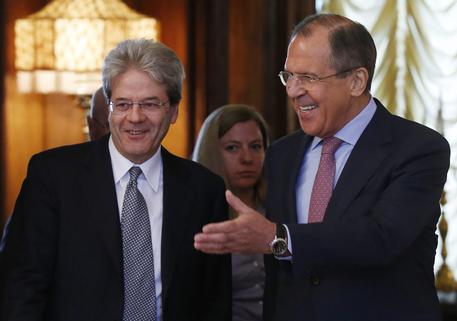
Moscow-Rome Axis Over Syria and Libya
Publication: Eurasia Daily Monitor Volume: 12 Issue: 226
By:

Converging interests are prompting Italy and Russia to forge an informal partnership to deal with the Syrian conflict and the Libyan civil war, which are among the most pressing security challenges facing the international community today. For distinct reasons, Rome and Moscow strive for geopolitical centrality: The Italian government is trying to regain a prominent role in the increasingly troubled Mediterranean region, and the Kremlin is attempting to tear down the economic and financial sanctions regime imposed on Russia by the European Union and the United States over its meddling and aggression in Ukraine.
The Italian cabinet has resolutely advanced the concept that solutions to the crises in Syria and Libya are impossible without Russia’s involvement in the respective peace processes (TASS, November 26). Italy’s stance is that political pragmatism should set the tone for Western-Russian relations. In this perspective, Rome expects the EU and the US to work to de-escalate tensions with the Russian government.
On December 3, on the sidelines of the Organization for Security and Cooperation in Europe (OSCE) ministerial conference, in the Serbian capital city Belgrade, Italian Foreign Minister Paolo Gentiloni and his Russian counterpart, Sergei Lavrov, voiced Italy and Russia’s shared commitment to fight the self-styled Islamic State (IS) in Syria, Iraq and Libya (Ansamed, December 3).
Within the framework of the International Syrian Support Group (ISSG), which includes the United Nations (UN), the Arab League, the EU and 17 countries, Rome is backing the ongoing political process to end the Syrian conflict. The Italian government keeps repeating that air strikes in Syria are not as strategically important as political accommodation on the ground, and that the US-led military coalition against the IS in Syria and Iraq—which Italy has joined in a non-combat role—should coordinate its action with Russia (Sputnik News, December 3).
Somewhat paradoxically, while Foreign Minister Gentiloni questions the operational effectiveness of the air campaign being conducted by Italy’s allies in the North Atlantic Treaty Organization (NATO), he views Russia’s (armed) intervention on Syrian territory as a game-changer (Sputnik News, November 27). According to him, the Russian air strikes could favor a possible smooth transfer of power in Damascus from the regime of Bashar al-Assad, which is supported by both Moscow and Teheran, to local opposition groups, excluding the IS and the al-Qaeda-affiliated al-Nusra Front.
In return for Italy backing Russia’s own interests in the Fertile Crescent, Rome expects Moscow’s support for the Italian response to war-torn Libya. Rome’s position on Libya coincides with that on Syria, namely that both crises are to be solved through negotiations among all the factions involved, save the IS, al-Nusra Front and Salafist groups. The Italian government, along with the UN, is trying to promote a political settlement in Libya between the two main warring forces: the internationally recognized government in Tobruk, in the country’s east, and the Islamist-leaning cabinet based in the capital city Tripoli.
Lavrov has reiterated time and again that Russia understands how Libya is important to Italy because of its geographical proximity and historical heritage (Repubblica, December 11; Rainews, December 11). The Russian foreign minister also blames the current crisis in the North African country, with the resulting rise of the IS militancy within its borders, on NATO’s unilateral decision to overthrow the Libyan regime of Muammar Gaddafi in 2011. It is worth remembering that Italy only reluctantly, and at a later stage, joined the anti-Gaddafi coalition led by the United Kingdom and France.
At an international conference in Rome, on December 13, convened by Italy, the US and the UN to bolster the political dialogue in Libya, Russian Deputy Foreign Minister Gennady Gatilov hailed efforts by both the international community and Libyan parties to counter the terrorist threat in that country (TASS, December 13). During Gaddafi’s tenure, Moscow kept close ties with the Libyan government, particularly in the energy sector. Now, the Kremlin is working to rebuild this relationship with Libya. Italy is a pillar of this strategy, much like Egypt, which has boosted its partnership with Russia of late and is the main sponsor of the Libyan government in Tobruk. It is no coincidence that Tobruk Government Prime Minister Abdullah al-Thani recently invoked the idea of a Russian intervention in Libya against the IS on the model of Moscow’s operations in Syria (The Libya Observer, December 4).
Helping Italy and Russia’s current geopolitical convergence on Syria and Libya are long-standing economic ties, not least the partnership that links the Italian state-controlled energy producer ENI and Russia’s state-owned natural gas monopoly Gazprom. In an interview to a Russian media outlet, on December 4, Lavrov underlined Italy’s position as one of Russia’s most important international partners (TASS, December 4). He also highlighted that transatlantic sanctions have had a negative impact on Italian-Russian relations. However, Lavrov praised Rome’s pragmatic and balanced approach to this situation, as the Italian government tries to minimize the impact of penalties on the bilateral partnership between the two countries.
Figures provided by Russian institutions indicate a 35 percent drop, year-on-year, in Russia’s total trade turnover with Italy in the first nine months of 2015 (Sputnik News, December 7). While the Italian Institute of Statistics (ISTAT) reports a 27.5 percent decrease, on an annual basis, in Italy’s exports to Russia in the first ten months of 2015 (Reuters Italia, November 24). In light of this data, Italian industry is pushing for the lifting of sanctions against Russia. Responding to the calls of the country’s business sector, the government in Rome recently called into question the probable automatic renewal of the EU’s penalties against Moscow and has requested a political debate on the issue (Il Sole 24 Ore, December 9; RT, December 10).
The problem for Italy’s Mediterranean ambitions is that the diplomatic axis with Russia is largely asymmetric. In its attempt to come across as an indispensable geopolitical interlocutor for the West in all the conflicts ravaging Europe’s southeastern neighborhood, Moscow is also turning to Germany, France and the UK—which, in turn, have all tried to sideline the Italian government over Syria and Libya in the past several months (Corriere.it, September 24). The Kremlin is a geopolitical heavyweight, and Italy is only one of several strategic options at the Russian government’s disposal to assert its agenda in the Middle East, North Africa and Eastern Europe. This is a role that Italy, on the other hand, cannot really claim. And such an imbalance could easily transform into a series of bilateral deals and agreements that are disproportionately unfavorable for Italy or the West in general.




